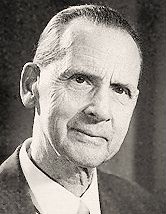A piano trio is a group of piano and two other instruments, usually a violin and a cello, or a piece of music written for such a group. It is one of the most common forms found in classical chamber music. The term can also refer to a group of musicians who regularly play this repertoire together; for a number of well-known piano trios, see below.
Arnold Atkinson Cooke was a British composer, a pupil of Paul Hindemith. He wrote a considerable amount of chamber music, including five string quartets and many instrumental sonatas, much of which is only now becoming accessible through modern recordings. Cooke also composed two operas, six symphonies and several concertos.
A clarinet–cello–piano trio is a clarinet trio made up of one clarinet, one cello, and one piano, or the name of a piece written for such a group.

William Waterhouse was an English bassoonist and musicologist. He played with notable orchestras, was a member of the Melos Ensemble, professor at the Royal Northern College of Music, author of the Yehudi Menuhin Music Guide "Bassoon", of The New Langwill Index, and contributor to the New Grove Dictionary of Music and Musicians.

Graham Waterhouse is an English composer and cellist who specializes in chamber music. He has composed a cello concerto, Three Pieces for Solo Cello and Variations for Cello Solo for his own instrument, and string quartets and compositions that juxtapose a quartet with a solo instrument, including Piccolo Quintet, Bassoon Quintet and the piano quintet Rhapsodie Macabre. He has set poetry for speaking voice and cello, such as Der Handschuh, and has written song cycles. His compositions reflect the individual capacity and character of players and instruments, from the piccolo to the contrabassoon.

Piccolo Quintet is short for the Quintet op. 26 of Graham Waterhouse, composed in 1989 for piccolo and string quartet and published by Zimmermann in 2002 as Quintet for piccolo, 2 violins, viola and violoncello.
Rudi Spring is a German composer of classical music, pianist and academic. He is known for vocal compositions on texts by poets and his own, and for chamber music such as his three Chamber Symphonies.
Jens Josef is a German composer of classical music, a flutist and academic teacher.
Jörg Duda is a German composer of classical music.

Bei Nacht, op. 50, is a piano trio, composed in 1999 by Graham Waterhouse, published by Hofmeister, Leipzig.

Der Handschuh is a composition by Graham Waterhouse. He wrote the setting of Friedrich Schiller's ballad for cello and speaking voice in 2005. It was published in 2007 in Heinrichshofen's Verlag.

Three Pieces for Solo Cello op. 28, is a composition for cello in three movements by Graham Waterhouse, dedicated to cellist Siegfried Palm in 1992. The composer, a cellist himself, wrote it to "exploit the characteristics" of his instrument. In 1996, a revised version won a composition prize and was performed at the Hochschule für Musik München. The work was published by the Friedrich Hofmeister Musikverlag in 1996 and recorded on a Portrait CD of chamber music in 2001.

Victor Bruns was a German composer and bassoonist. He played with the Leningrad Opera, the Volksoper Berlin and the Staatskapelle Berlin. As a composer, he is known for his ballets and for bassoon concertos and sonatas.

Mouvements d'Harmonie op. 29 is a composition in one movement for wind ensemble, written by Graham Waterhouse in 1991, dedicated to William Waterhouse. It was first performed on 24 May 1991 in the Purcell Room, London. The piece was published in 2000 by Accolade, Holzhausen. It was recorded by Endymion in 2002 on a composer portrait CD.

Graham Waterhouse, cellist and composer especially of chamber music, has written a number of works for string quartet, three major works in several movements, several smaller works and compositions for a solo instrument and string quartet.
Chieftain's Salute is a concerto in one movement for Great Highland Bagpipe and orchestra by Graham Waterhouse. The work is one of few to use the bagpipe with a classical orchestra. A version for bagpipe and string orchestra, Op. 34a, was composed in 2001. It is based on an earlier work for bagpipe and string quartet. Jacobean Salute was also derived from the early work, with a wind quintet replacing the bagpipe, published in 2003. A version for bagpipe and orchestra was composed and first performed in 2015.

Graham Waterhouse, cellist and composer especially of chamber music, has written a number of song cycles. As a cellist, he has used string instruments or a Pierrot ensemble instead of the typical piano to accompany a singer. In 2003 he composed a first cycle of songs based on late poems by Friedrich Hölderlin. In 2016, he set nursery rhymes, excerpts from James Joyce, and texts by Shakespeare. In 2017, he wrote settings of poems by Irish female writers, and in 2022 a cycle of Buddhist texts for mezzo-soprano, cello and piano.

Praeludium (Prelude), Op. 32, is a piece for piano by Graham Waterhouse, composed in 1992 and published by Lienau in 2002. The virtuoso composition has been played in concert internationally, and was recorded.

Concentricities is a piano trio by Graham Waterhouse composed in 2019 for clarinet, cello and piano. It was premiered, with the composer as the cellist, at the Gasteig in Munich the same year. It was published by Schott Music.




